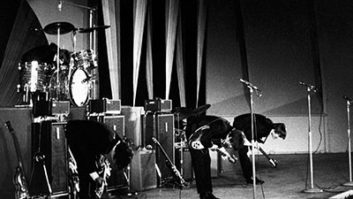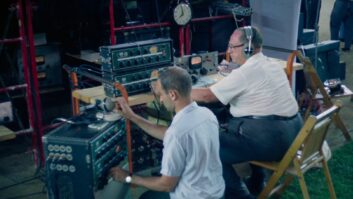“There’s a quote by Degas where he says, ‘Drawing is not what one sees, but what one must make others see.’ And in a way, that’s what we do in sound. The recording is not what one hears, but what one must make others hear.”

That knowing observation comes early in the 2012 feature-length documentary, Produced By George Martin, now out on DVD and Blu-Ray. Having worked over the years with everyone from Elton John to Burt Bacharach to the four lads from Liverpool, the film’s charming subject comes to the forefront as he’s interviewed by the likes of Paul McCartney, Ringo Starr, Michael Palin and his own son/protégé, Giles Martin.
While the elder Martin made his mark on pop music through his work with the Beatles, the film traces his entire career, ably showing how his background paved the way not only for his and the band’s success, but for his ability to make the most of their music as it quickly evolved.
Having been appointed by EMI as the head of Parlophone Records while only in his 20s, Martin found he’d inherited a struggling label that needed to do something radically different in order to compete. That in turn led him not to The Beatles, but to the team behind The Goon Show, the legendary absurdist comedy series on BBC radio—a move that resulted in a string of hit comedy albums.
When Rock n’ Roll came along, Martin instantly wanted a rock act on his label too, not out of love of the music—which the classically trained producer didn’t quite get—but because they would be easier to produce than comedy albums, which required the right voice talent, script, sound effects and engineering in order to transport the listener into an imaginary setting. Nonetheless, that comedy experience would inform his efforts on the later Beatles albums, as Martin himself notes that creating Sgt. Pepper’s Lonely Hearts Club Band became a bit like working on a Peter Sellers record because he was “building pictures with sound.”
Of course, that work came after the Beatles stopped touring, allowing themselves months in the studio to perfect their songs. Reminiscing with McCartney, Martin recalls the early years of Beatlemania, where he could only get “scraps of time” in the band’s busy schedule to record the group in Abbey Road. The result was that a typical session, fitted in on a spare afternoon, often found the band recording two now-classic songs in just three hours.
While the mood of the documentary is almost always upbeat and polite—much like Martin himself—there’s the occasional telling moment of discord, such as when he readily admits he still has a chip on his shoulder against EMI for not giving him a Christmas bonus in 1963 after songs he had produced for the company spent a collective 37 weeks at Number One. Likewise, Martin’s comments about John Lennon throughout the film are guarded—though his thoughts on changes to his Let It Be tracks are not, as he suggests the credits should have read, “Produced by George Martin. Over-produced by Phil Spector.”
While the film explores life in the studio, it doesn’t get caught up in techie minutia. There’s a brief explanation of how Martin invented backmasking for John Lennon’s “Rain” on Revolver and some great footage of loops strung through the tape machines of Abbey Road, but the documentary wisely focuses on the relationships between artists and producer instead, including a hilarious moment where McCartney and Martin today dissect a photo of a late Sixties Paul excitedly manning the console while his grimacing mentor looks on.
It’s not an all-Beatles affair either; in fact, a good half-hour goes by before the mop-tops appear in the narrative. Other high points include great footage of the recording session for Cilla Black’s “Alfie,” complete with Burt Bacharach conducting and playing piano on his sumptuous song; Martin wistfully visiting his now rubble-strewn AIR Montserrat Studios, abandoned after a devastating hurricane in 1989; and apropos of nothing, Martin’s archly placid demonstration of how to make the perfect Martini, set to the James Bond theme, “Live And Let Die.”
52 minutes of extras are included, with the likes of producers Rick Rubin, T-Bone Burnett and Ken Scott singing Martin’s praises; extended interviews from the film; and a lengthy tale from Jimmy Webb about how he and Martin dangerously recorded a sail plane wooshing by at 200 MPH.
Thorough, career-encompassing documentaries like this typically only come along once their subjects are deceased. Luckily, Martin is still with us and his vital insights inform every second of Produced By George Martin. Whether you’re a Beatles fan or a recording pro interested in seeing how the gold standard for studio professionalism conducts himself, this film is a must-see.
Produced By George Martin on Amazon
http://amzn.to/UIllg2




